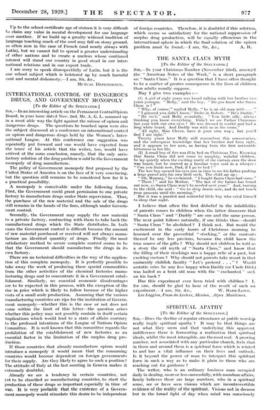INTERNATIONAL CONTROL OF DANGEROUS DRUGS, AND GOVERNMENT MONOPOLY [To the
Editor of the SPECTATOR.]
Sin,—In an interesting article on the Permanent Central Opium Board, in your issue dated Nov. 2nd, Mr. A. G. L. summed up in a most able way the fight against the misuse of opium and dangerous drugs. The questions he touched upon were also the subject discussed at a conference on international control on opium and dangerous drugs held by the Women's Inter- national League. At this conference one suggestion was repeatedly put forward and one would have expected from the tenor of his article that the writer, too, would have arrived at the same conclusion, namely, that the only satis- factory solution of the drug problem would be the Government monopoly of drug manufacture.
The policy of Government monopoly first proposed by the United States of America is on the face of it very convincing, but the question still remains to be considered how far it is a practical possibility.
A monopoly is conceivable under the following forms. First, the Government could grant permission to one private factory to manufacture drugs under State supervision. Thus, the purchase of the raw material and the sale of the drugs still remains in the hands of the firm, although under Govern- ment control. • Secondly, the Government may supply the raw material to a private factory, contracting with them to take back the manufactured drugs which the State distributes. In both cases the Government control is difficult because the amount of raw material purchased or received will not always manu- facture an . identical quantity of drugs. Finally the most satisfactory method to secure complete control seems to be that the Government should manufacture the drugs in its own factory.
There are no technical difficulties in the way of the applica- tion of this complete monopoly. It is perfectly possible to take away the work of producing these special commodities from the other activities of the chemical factories manu- facturing drugs and to concentrate it in a Government estab- lishment. Similarly, no essential economic disadvantages are to be expected in this process, with the exception of the rise in price which is likely to follow because of the higher costs of a small scale production. Assuming that the various manufacturing countries are ripe for the institution of Govern.. ment monopoly—whether this is the case or not does not come within the limit of this letter—the question arises whether this policy may not possibly contain in itself certain implications which would lead to a state of affairs contrary to the professed intentions of the League of Nations Opium Committee. It is well known that this committee regards the prohibition of the establishment of new factories as an essential factor in the limitation of the surplus drug pro- duction.
If those countries that already manufacture opium would introduce a monopoly it would mean that the consuming countries would become dependent on foreign governments for their supply. Are they likely to agree to such a position? The attitude of Italy at the last meeting in Geneva makes it extremely doubtful.
Already we see a tendency in certain countries, not yet to be classified as manufacturing countries, to start the production of these drugs so important especially in time of war.. It is very probable that the existence of a Govern- ment monopoly would stimulate this desire to be independent
of foreign countries. Therefore, it is doubtful if this solution, which seems so satisfactory for the national suppression of surplus drug production, will be equally efficacious in the international sphere in which the final solution of the opium problem must be found.—I am, Sir, &c., A. H. .
































 Previous page
Previous page